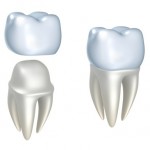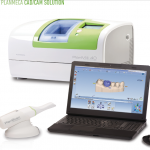 Crowns are dental restorations that completely cover or cap teeth, restoring them to their natural size, shape, and color. Your dentist will recommend you to have a dental crown done if:
Crowns are dental restorations that completely cover or cap teeth, restoring them to their natural size, shape, and color. Your dentist will recommend you to have a dental crown done if:
- Your tooth is weak from a fracture or severely worn down
- Post root canal treatment has been done to treat a badly decayed tooth
- You have done a dental implant procedure
- A dental bridge is needed
Traditionally, a minimum of two dental visits is required to prepare for a dental crown. During the first visit, the preparation for the crown will require approximately 1mm of weakened tooth structure to be removed in order to make space for a crown. An impression of the tooth will then be made and is sent to the dental laboratory. A temporary crown will be made to protect the tooth until the definitive crown is ready. This is usually made of resin and is not meant to last more than 1 month, although if you cannot return within this time, your dentist can ensure it is strong enough to last until you can.
During the second visit, your dentist will remove the temporary crown and check the colour and fit of the permanent crown, before they permanently cement the new crown in place.
New Technology
A new technology toda y has made same-day dental restorations, including crowns possible. At Specialist Dental Group®, a new technology in place can expedite the process of placing a permanent dental crown.
y has made same-day dental restorations, including crowns possible. At Specialist Dental Group®, a new technology in place can expedite the process of placing a permanent dental crown.
ThePlanmeca CAD/CAM Solution allows digital models to be created and designed, and then fabricated on the same day. It is an innovative, technologically advanced, and ultra-fast intraoral system for restorative dentistry.
Together with the Planmeca Planmill for manufacturing prostheses, patients will be able to have their crowns, inlays, onlays, bridges and veneers made on the same day.
This device scans and captures the oral environment with precision, and processes data almost as quickly as the dentists’ hand movements. This means that people with one missing tooth, several missing teeth or are fully edentulous (totally no teeth at all in the jaw) will be able to have their digital dental restorations created and designed by this device, instead of the traditional impressions. The mill then fabricates the restoration designs quickly and conveniently, with micron-precise accuracy.
With this new time-effective technology, the process of fabricating dental prosthesis like crowns and bridges that would otherwise take a few weeks is dramatically shortened into a matter of hours. An added benefit of this digital dental solution is the prostheses’ precise fit for patients’ maximum comfort.
If you would like to keep updated on the latest (and interesting) dental news, subscribe to our blog.





